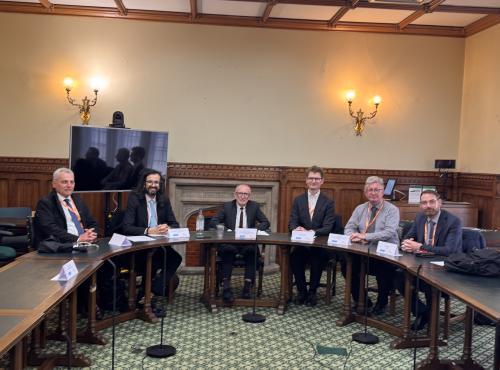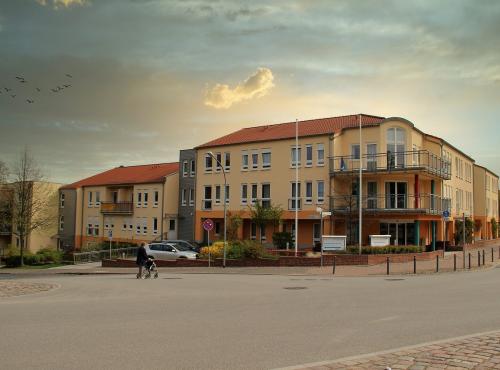Prepare, Practice, Protect: Improving Carbon Monoxide Safety in Health and Care Services
Report sets out how health and social care workers can protect themselves and patients from carbon monoxide poisoning.
Policy Connect and the All-Party Parliamentary Carbon Monoxide Group latest report, ‘Prepare, Practice, Protect: Improving Carbon Monoxide Safety in Health and Care Services’, examines the extent to which frontline health and social care professionals (HSCPs) are aware of and protected from carbon monoxide, and sets out how improvements can be made in an effective, manageable, and practical way.
Findings show that awareness of carbon monoxide exposure is low, and many health care professionals are not aware of the correct actions to take once exposure is suspected. Furthermore, risk assessments were reported to take place in less than half of the circumstances when they should be mandated.
This comes at a critical time as households in fuel poverty are at an elevated risk of carbon monoxide exposure and more homes are falling into fuel poverty amid the energy and cost-of-living crises. The Gas Safe Register has found a high level (1 in 5) of faulty or dangerous gas appliances in homes in the UK, which could harm occupants by emitting carbon monoxide and other pollutants.
HSCPs such as occupational therapists, social workers, midwives, nurses, and care workers are ideally placed to identify and address carbon monoxide exposure: with status as a trusted adviser, access to the individual’s home, and existing healthcare knowledge.
However, individual professionals can only do so much alone. For change to be effective, it must be supported by sector-wide safety practices and protocols to follow. The report’s recommendations are written for those with influence in the sector: regulatory bodies, professional bodies, local and central government.
The co-benefits of good practice are clear: a healthy and educated workforce, reduced demand on the health care system, and better public health. All these advantages can be gained by implementing small changes, such as training to enable early identification of carbon monoxide poisoning, and taking preventative action, such as installing alarms and regular appliance servicing.
Liz Twist MP, Inquiry Chair:
“As many more households fall into fuel poverty, carbon monoxide is a very real risk for home environments. The brave and tenacious individuals who enter the homes of others to provide treatment, care, and support must be assured that the environment they are working in is safe.
By understanding the symptoms of carbon monoxide poisoning and knowing the right questions to ask, professionals can more readily identify cases of potential exposure and respond appropriately. However, it is vital to have management support and a pathway to ensure that the issues identified can be safety resolved.
As carbon monoxide can lead to long term health conditions, a correct diagnosis of poisoning could unlock co-benefits of a healthy and educated workforce, reduced demand on the health care system, and better public health.”
Adrian McConnell, Chief Exec, CO Research Trust (report sponsor):
“The report highlights the role frontline health and social care professionals play, as the ‘canary in the mine’, when it comes to protecting our most vulnerable members of society. It emphasises the need to listen carefully to frontline staff and recommends several actions that should be taken to provide the framework, training, and support, they need to protect themselves and their patients. As COVID and the cost-of-living crisis has shown, these professionals are the often-unsung heroes of our health and social care services, and we hope that decision makers will carefully consider this report.”
Dan Edwards, SGN (report sponsor):
“SGN and the GDNs are delighted to have sponsored this important and timely report. Carbon monoxide is not only fatal but linked to many health conditions and illnesses. Ensuring our communities are safe from this poisonous gas is imperative. This report recognises that heath and care professionals are ideally placed to identify and address carbon monoxide exposure, with status as a trusted adviser, access to the individual’s home, and existing healthcare knowledge. The report makes practical recommendations that will support our health and care workers to protect themselves and their patients.”
Isabella Myers, COMed:
“This report comes at a time when many more households are falling into fuel poverty, and subsequently at greater risk of carbon monoxide exposure. It is more important than ever that professionals working in homes are aware of and equipped to deal with the risks to their patients and themselves. This report makes practical recommendations for sector leaders to increase training and awareness for their staff as well as emphasising the importance of integrating social care, health care and housing, so that that indoor air quality concerns can be communicated and resolved effectively.”
NOTES FOR EDITORS
For further details, please contact kevin.herron [at] policyconnect.org.uk
This report was kindly sponsored by The CO Research Trust, Cadent, SGN, Northern Gas Networks, Wales & West Utilities, and the Gas Industry Safety Group.
What is carbon monoxide?
Carbon monoxide is a poisonous gas that has no taste, colour, or odour; and thus, it cannot be detected by human senses. It is produced by the incomplete combustion of carbon-based fuels such as gas, oil, liquefied petroleum gas (LPG), biomass, and wood. At high concentrations, carbon monoxide can cause death.
Carbon monoxide is also linked to many health conditions and illnesses; from which individuals may never fully recover, such as acquired brain injury; neurological symptoms; low birth weight in babies; reduced mortality; sensory impairments; falls; and even personality change; in addition to cases of fatality.
Carbon monoxide has a far greater affinity to haemoglobin than oxygen, with some estimating that it is 245 times higher. This means that if an individual is exposed to a sub-lethal level of carbon monoxide for extended periods of time, or repeatedly over a short time, the poison ‘sticks’ to the blood, and levels of carbon monoxide in the body can increase gradually.
One study found 4.3% of patients presenting with non-specific symptoms in the Emergency Department had unexpectedly raised carboxyhaemoglobin (COHb) levels, indicating recent exposure.
It is also difficult to diagnose, as noted by UK Health Security Agency, “[i]t can be hard to tell the difference between the effects of being exposed to carbon monoxide at low levels for a long time and other common illnesses.”
About The All-Party Parliamentary Carbon Monoxide Group
The All-Party Parliamentary Carbon Monoxide Group (APPCOG) is the leading forum for parliamentarians from both the Houses of Commons and Lords to work together to address carbon monoxide poisoning. Through its busy programme of events and research, the Group seeks to push the vital issue of carbon monoxide safety up the political agenda, to improve government policy, to support research and to raise public awareness of the threat posed by carbon monoxide. The All-Party Group is supported by the think tank Policy Connect and receives funding from the four Gas Distribution Networks (GDNs) to carry out its work.
About Policy Connect
Policy Connect is a cross-party think tank. We specialise in supporting parliamentary groups, forums and commissions, delivering impactful policy research and event programmes and bringing together parliamentarians and government in collaboration with academia, business and civil society to help shape public policy in Westminster and Whitehall, so as to improve people’s lives.
Our work focusses on five key policy areas which are: Education & Skills; Industry, Technology & Innovation; Sustainability; Health; and Assistive & Accessible Technology.
We are a social enterprise and are funded by a combination of regular annual membership subscriptions and time-limited sponsorships. We are proud to be a Disability Confident and London Living Wage employer, and a member of Social Enterprise UK.
This is not an official publication of the House of Commons or the House of Lords. It has not been approved by either House or its committees. All-Party Parliamentary Groups are informal groups of Members of both Houses with a common interest in particular issues. The views expressed in this report are those of the group.




